History of origin
Art Deco appeared at the beginning of the 20th century and was initially used far from residential interiors. The first mentions appeared in 1925 in Paris, where it was positioned as a symbol of modern art and progress. After that, it began to be widely used in expensive restaurants and bars.
Its popularity peaked before the Second World War. It was then that the richest segment of the population around the world began to decorate their apartments and houses in the Art Deco style.
But after the war, interest in it noticeably faded. Fortunately, not for long – in the 60s it began to experience a revival and received noticeable development. Today, Art Deco is perceived as a base that will remain in fashion for a long time.
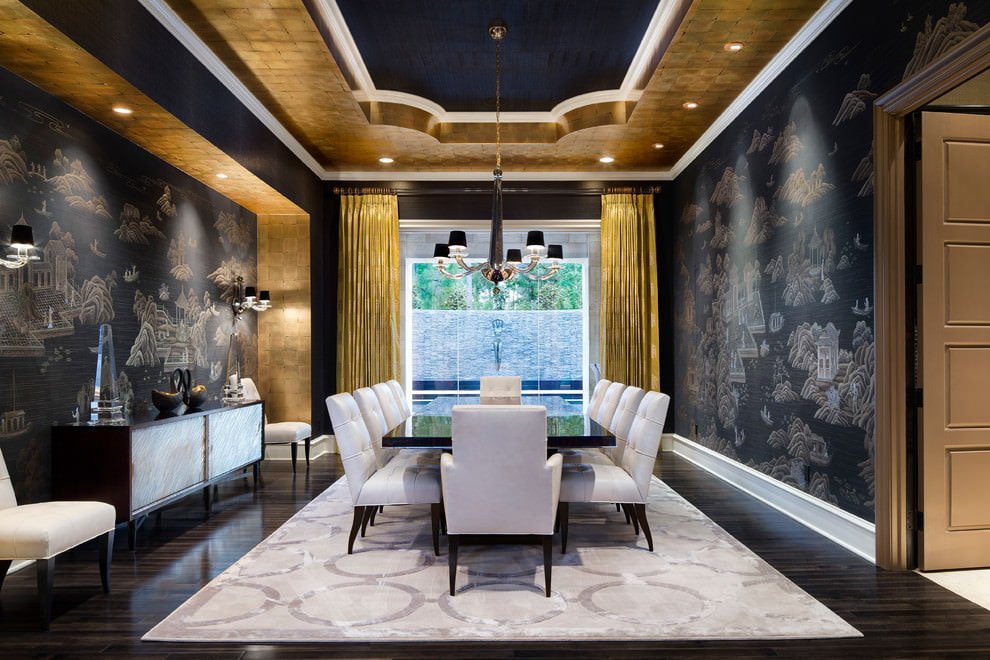

Characteristic features
Since Art Deco arose in the era of great social and technological changes, it embodied all the best. In order to fully experience this style, it is important to analyze its distinctive characteristics.
I would like to note that Art Deco is not just an interior style, it is a real philosophy that symbolizes the desire for an ideal balance between luxury and exquisite taste.
Let’s consider what distinct features the style of the era of art, discoveries and travel has:
- Geometry – the presence of graphic and clear forms, broken and straight lines. Strict geometric shapes (from zigzags to straight lines) can be seen in furniture, decoration and textiles. Everything should be symmetrical and harmonious.
- Luxurious and rare materials. It is important to emphasize your status and elitism. Use exotic types of stone or wood.
- Glossy surfaces perfectly reflect the origin of the style and its primary use (expensive restaurants, bars, etc.). The interior should shine, but keep in mind that you will live there and everything should be in moderation.
- Elements of exoticism and ethnic motifs. The Art Deco style contains elements from African cultures and nature. They can be found among accessories, on carpets or wallpaper.
- Decorativeness. Each accent in Art Deco should not just decorate the interior, it should attract attention and keep a story in itself. So that you have something to show and tell your sophisticated guests.
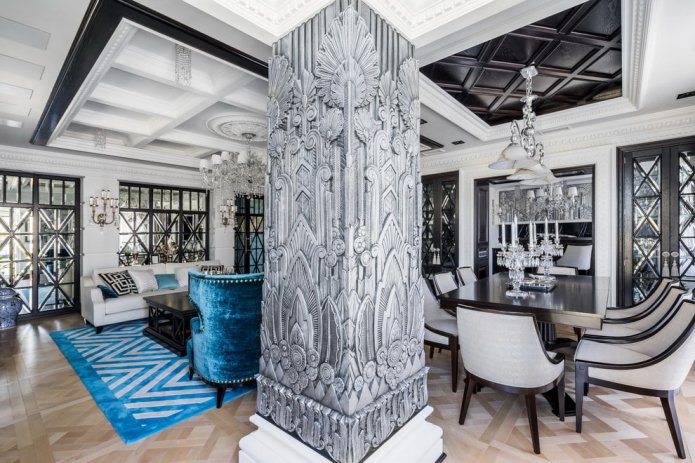
Who is Art Deco suitable for?
Since the style is quite bright and exclusive, it will not suit everyone. Choose Art Deco if you have at least 2 points in common:
- You love luxury with elements of elegance.
- You like to make a bright impression on others.
- You appreciate and understand the art and history of the 20-30s of the 20th century.
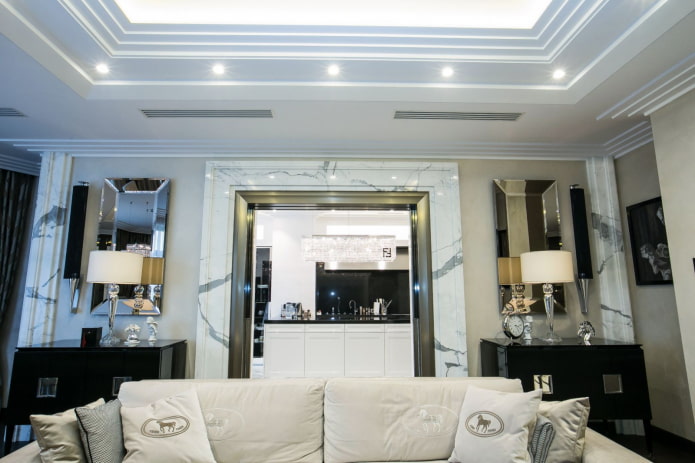
What colors to choose?
The style is characterized by a palette of gray, brown and cream tones, as well as decoration in shades of leather, metal or wood. Burgundy, red, green or golden colors are used as spectacular accents.
See how to combine colors correctly.
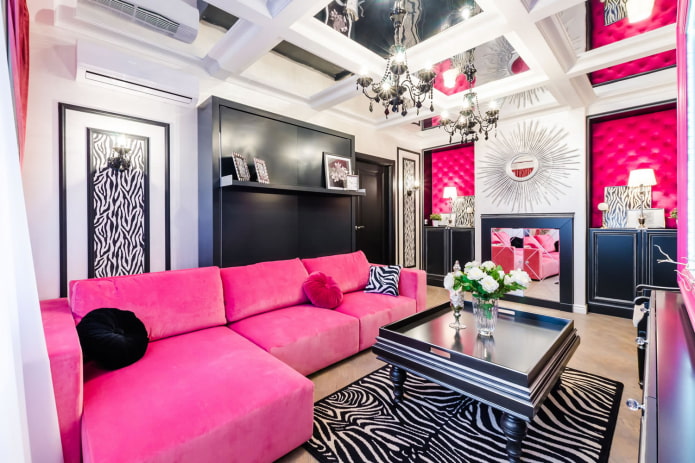
The photo shows a living room design in black and white with bright elements.

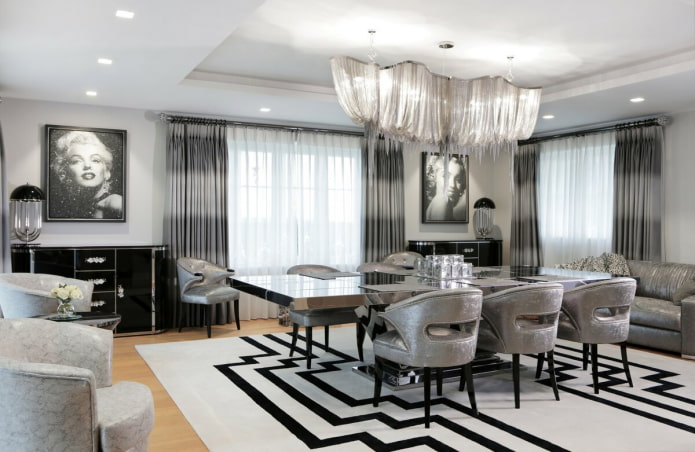
Forms and patterns
Art Deco in the interior involves the use of patterns in the form of various lines, repeating circles, diamonds or squares. In the design of textiles, there are plant motifs and leopard or zebra prints.
You can add some restraint to the atmosphere with the help of stripes or checks. Floral patterns or curls will help fill the space with lightness and coquetry, and large patterns reminiscent of damask will give the apartment historical luxury.
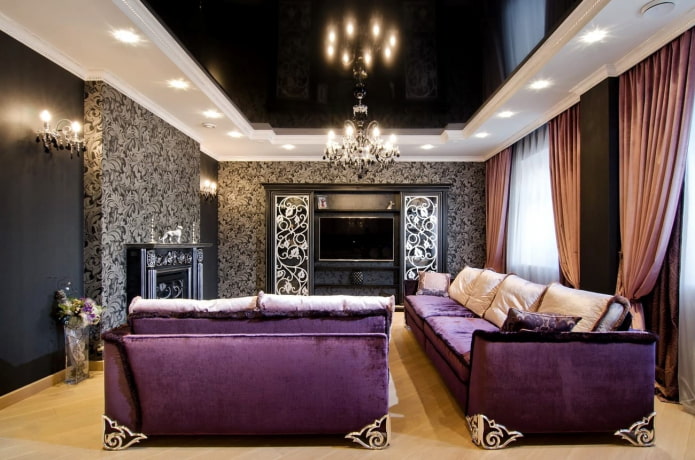
The photo shows a set of upholstered furniture with a purple sofa on figured legs.

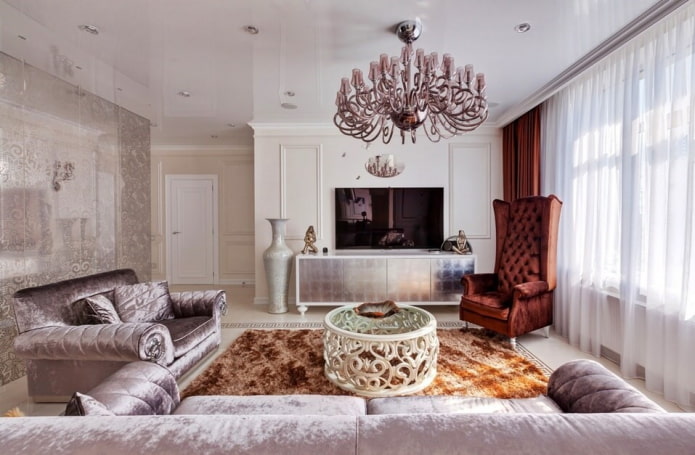
Art Deco involves the use of oval and round shapes, the presence of waves and arches. Any of these figures can be displayed in the design of doors, furniture or the ceiling surface.
What materials are best to use?
Every detail in the interior should reflect luxury and elegance – this is the main criterion that underlies the choice of everything. Art Deco is not a place for budget solutions. All materials must be of high quality. Now I will give a base for choosing a material, and below I will give recommendations on choosing finishing materials for various surfaces.
So, the most popular materials:
- Wood. Choose valuable wood species – rosewood, ebony, teak, stained walnut, etc. If the budget is limited, but you really want to decorate your apartment in the Art Deco style, you can consider a high-quality imitation.
- Metal. Pay attention to chrome details, gold, silver or brass. Be careful with gold elements, because a cheap coating can spoil the interior.
- Stone. You can safely choose not only marble, but also onyx or granite. They have a recognizable natural pattern that has proven to emphasize your exquisite taste.
- Mirrors and glass. Mirror elements will add space to the room, and glass will fill it with light and make even a small room airy and expensive.
- Fabrics and leather. For Art Deco, it is better to use expensive types of fabric – velvet or silk. They will fill the interior with unique chic and emphasize the coziness.
Based on these materials, you can easily select furniture, finishing coatings or decor.

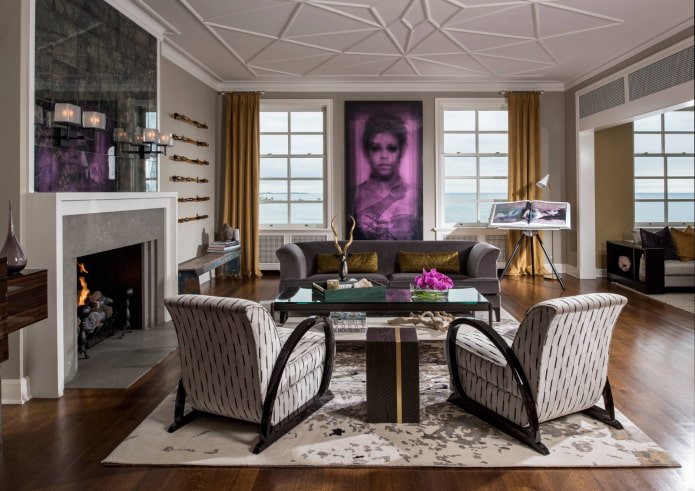
Finishing options
During the renovation, you should take care of high-quality wall finishing. Even minor defects can spoil the impression of the design.
In the Art Deco interior, the walls are decorated with plaster, wood panels, paint, or textured wallpaper.
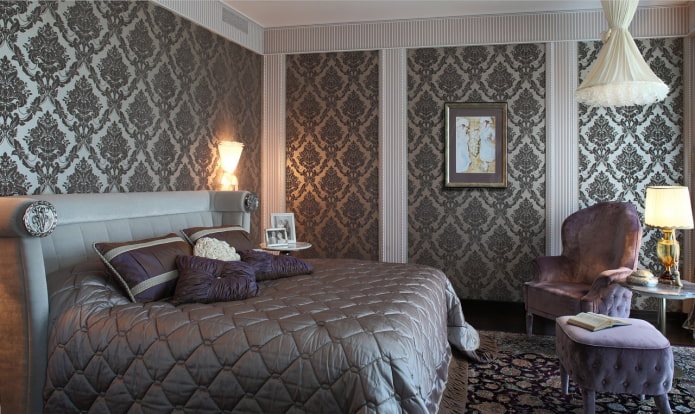
The photo shows a bedroom, the walls of which are decorated with wallpaper with patterns.
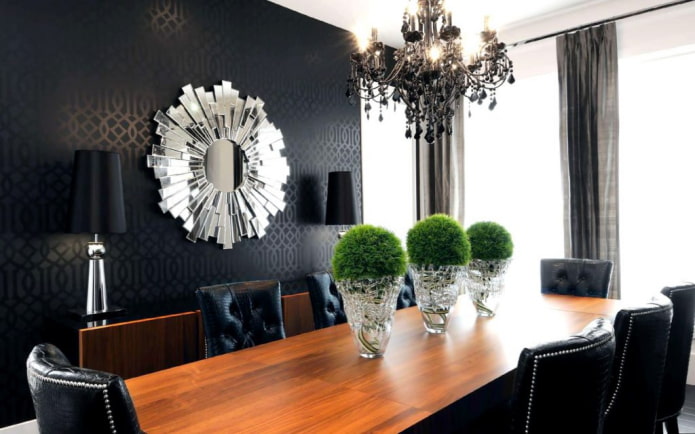
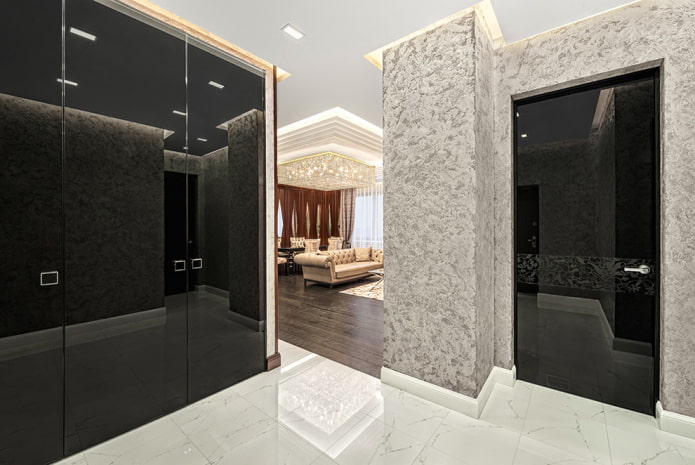
If you decide to use wooden panels, they are best suited for partial finishing – an accent wall or partition. The surface is usually varnished or decorated with metal/glass details.
When covering with wallpaper or decorative plaster, materials with a silky sheen are especially appropriate. You can also use wallpaper with geometric patterns or plant motifs. Metallic coatings with gold and silver accents are suitable for creating a luxurious look.
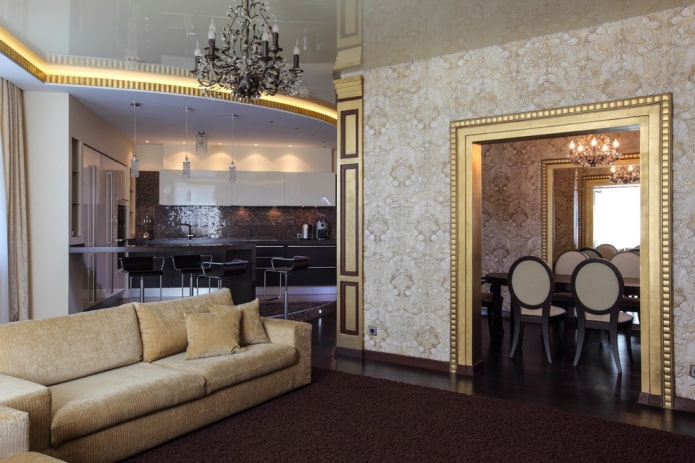
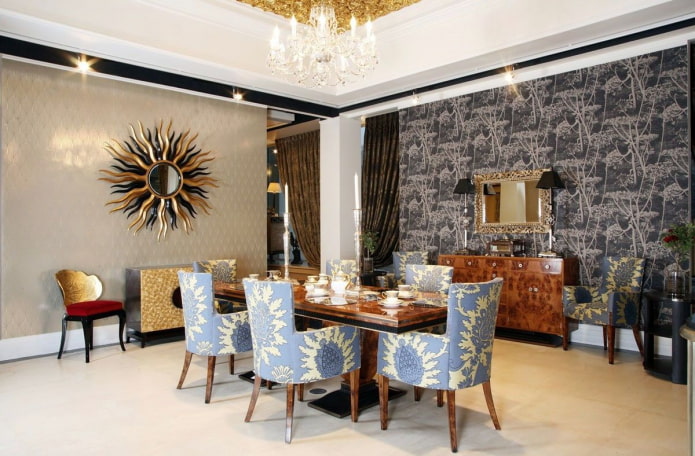
Checkered marble porcelain tiles are ideal for the floor. And for wood lovers, herringbone parquet is worth choosing.
The floor surface should be polished and have a glossy texture. Art Deco allows for floor finishing in chestnut, dark walnut or dark chocolate shades.
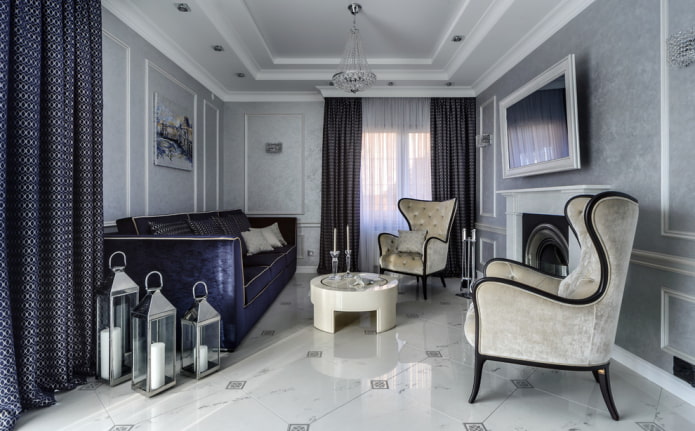
The photo shows a living room with a glossy floor made of white ceramic tiles.
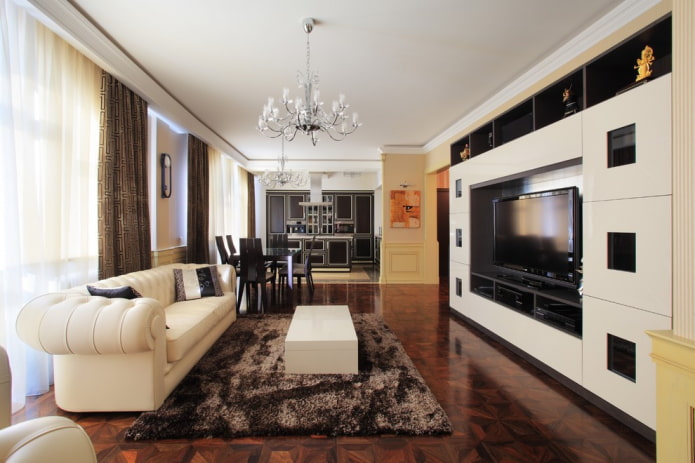

A low ceiling can be decorated with a mirror or stretch glossy canvas, and if the room is high enough, it can be decorated with complex stepped structures or stucco.
A laconic painting of the ceiling in a light shade in combination with borders or baseboards looks no less advantageous in Art Deco. A more expressive solution is multi-level plasterboard systems with built-in lamps or backlighting.

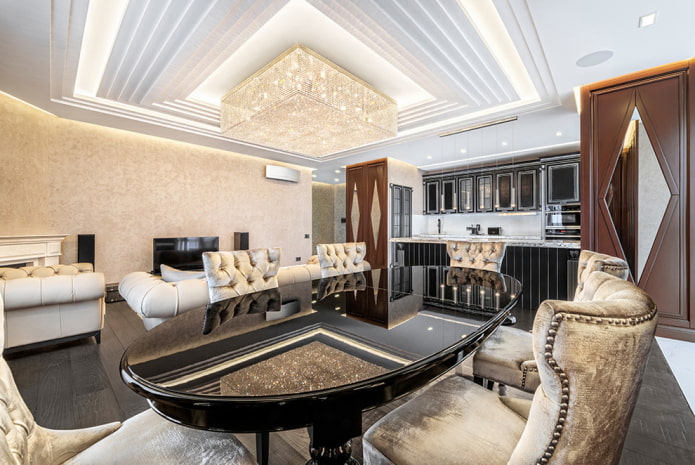
Satin stretch ceilings with subdued reflection are popular in Art Deco interiors. To emphasize the decorativeness of the style in a country house or mansion, a light stained glass window is mounted in the ceiling.
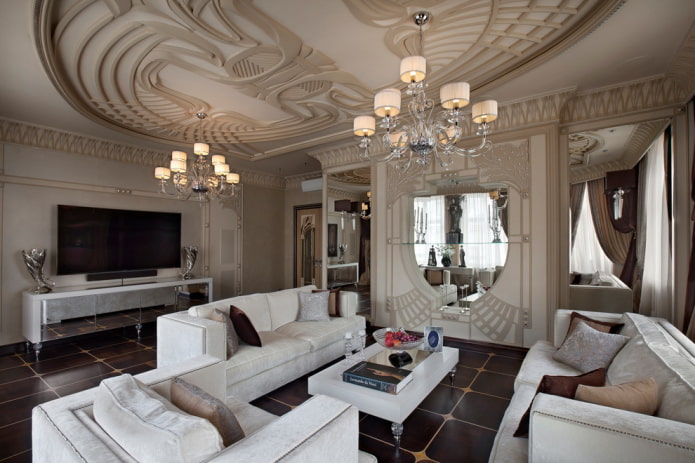
Distinctive features of door designs are impeccable geometric shapes, straight lines, panels and moldings.
Interior doors are made of expensive materials and are sometimes decorated with glass inserts, metal handles, moldings, platbands or baguettes. Some models are decorated with carved patterns or inlay.
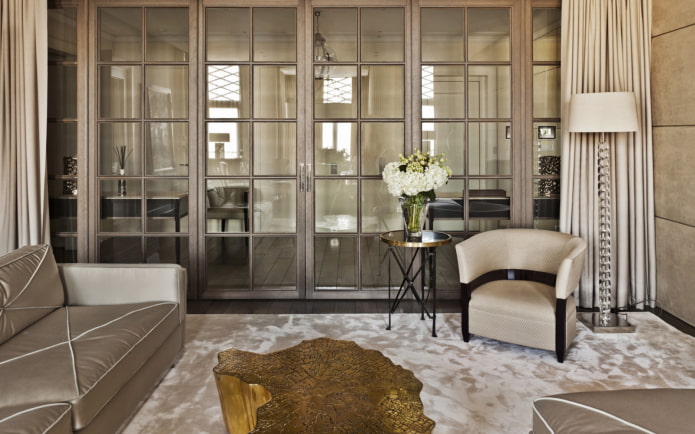
The photo shows a living room, where the space is divided by a partition with glass doors.
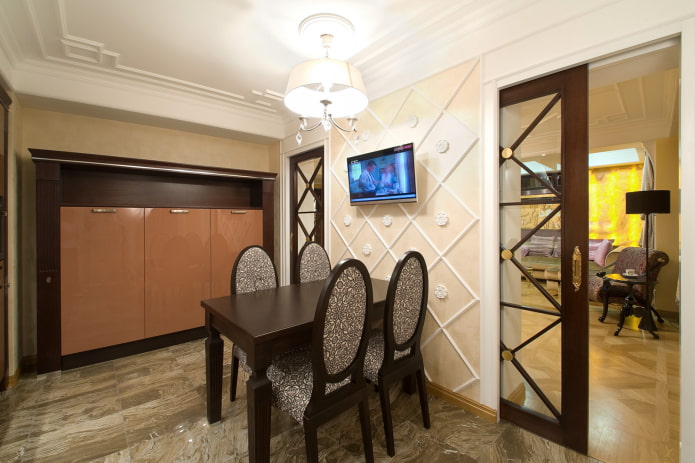
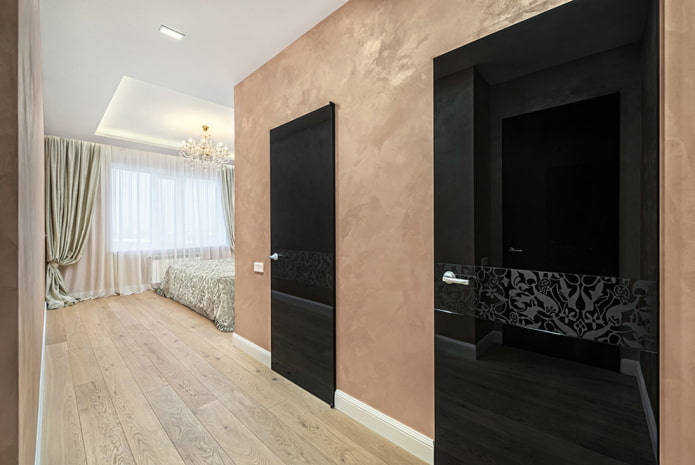
Art Deco implies the presence of spiral or semicircular staircases, distinguished by their special elegance and lightness. Stair railings are often forged in the form of floral or ethnic motifs, which can echo the patterns in the decoration of the walls or floor. The staircase should have spacious landings, the presence of tiers and podiums is welcome.
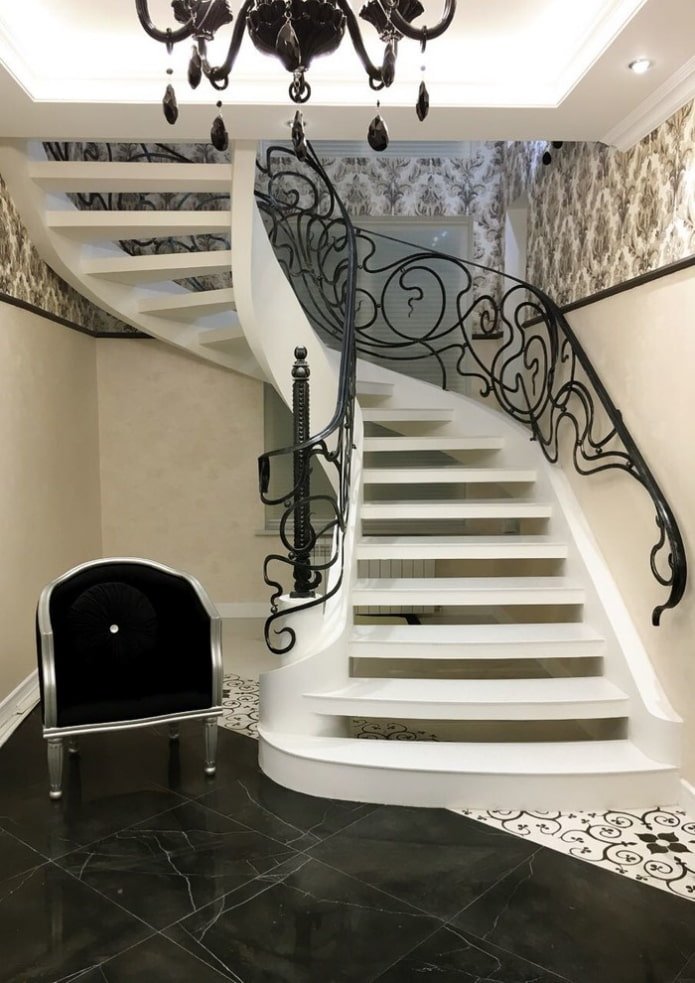
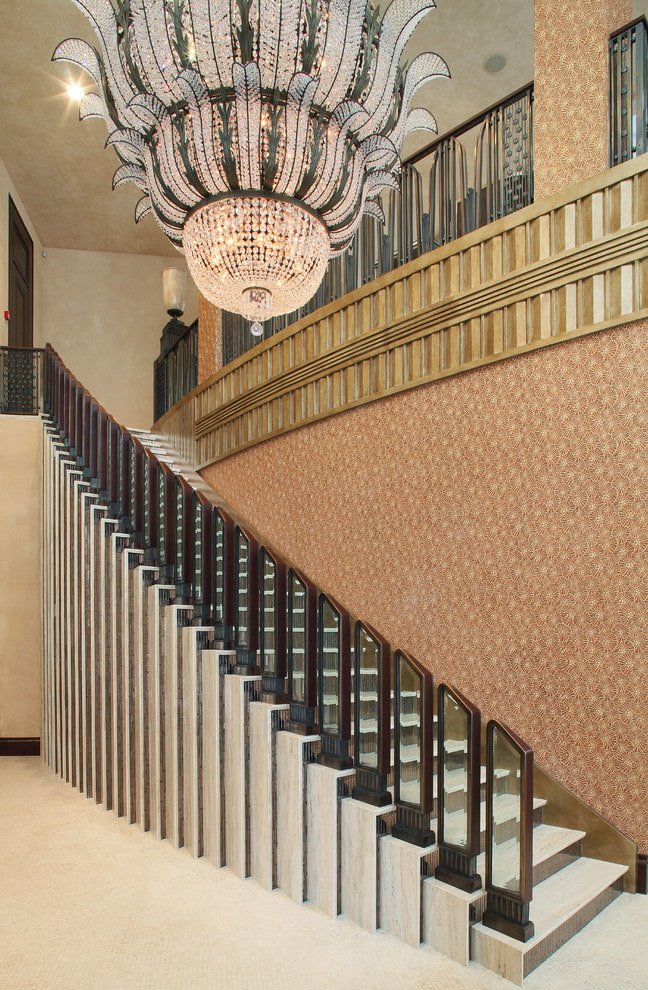
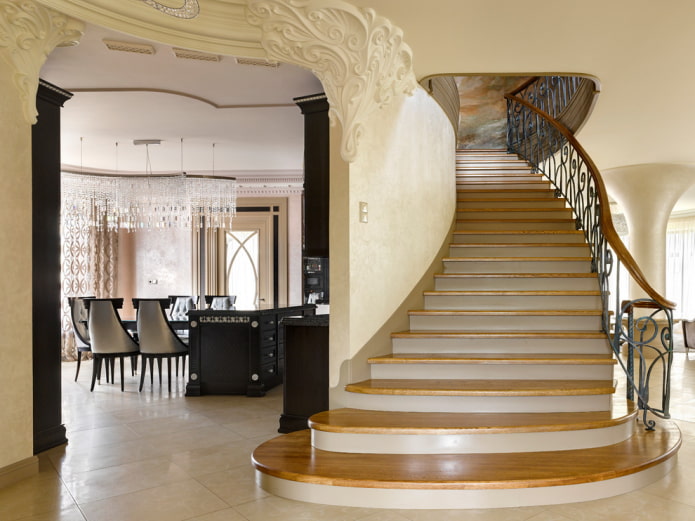
How to choose furniture?
Throne-shaped chairs, a couch with a trapezoidal back or barrel chairs with leather or fabric upholstery are suitable for arranging the interior. Original shelves, chests of drawers or bedside tables of a curved or elongated shape are appropriate.
Tables with crossed legs, complemented by inlay, and sofas with royal high backs are very popular in Art Deco.
The main element of the bedroom furnishings is a bed with a figured headboard, covered with leather or silk material with shiny decorative elements. In the kitchen space, a countertop and sink made of natural stone look especially advantageous.

The photo shows a kitchen with a set and a dining group, decorated in black and silver tones.

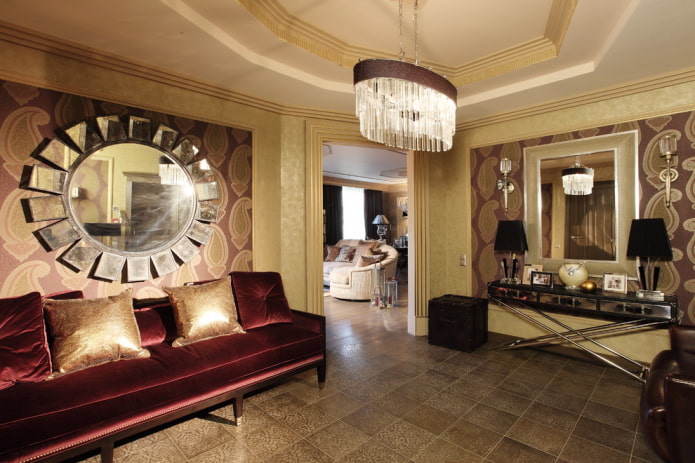
Only high-quality natural materials are used in the manufacture of cabinets, such as noble species of rosewood or mahogany. Various details add a special elite look to the furniture: coffee tables decorated with Cubist patterns, chairs upholstered in crocodile or shark skin, as well as items inlaid with ivory are welcome.
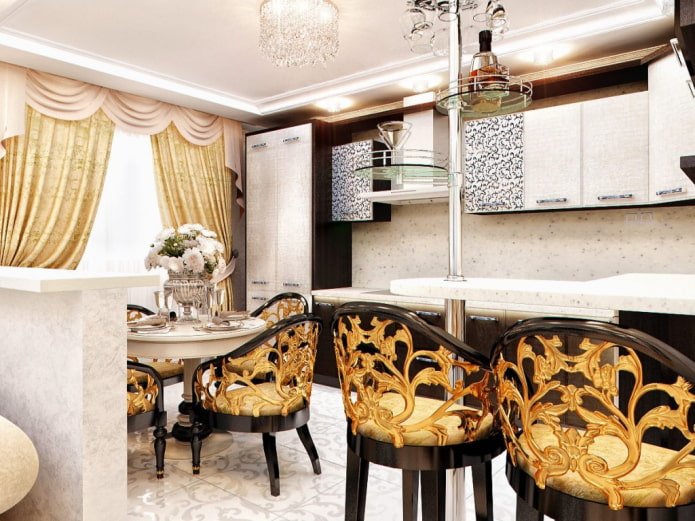
The photo shows chairs with openwork backs that complement the kitchen.
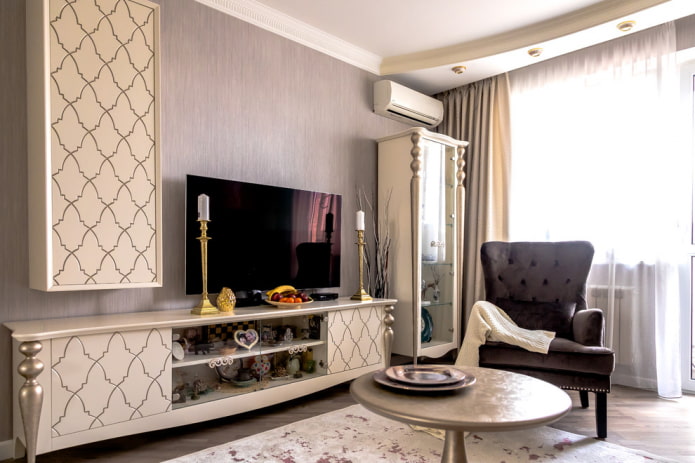

Rules for Choosing Curtains and Textiles
Textile design plays an important role in this style. Curtains are distinguished by their complex execution and are made of expensive velvet or satin fabrics.
The design of decorative pillows sometimes includes Arabic, ethnic or African patterns. A soft carpet in black, brown or gray shades adds additional coziness to the interior. It is often decorated with cubic, snake or floral patterns typical of this style.
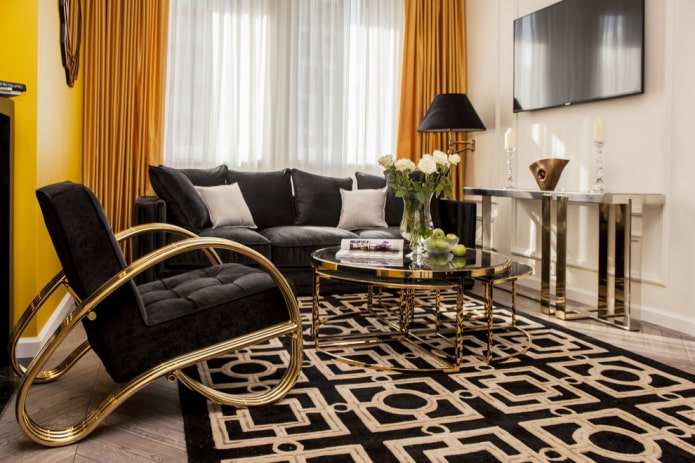
The photo shows an interior where the smooth lines of exquisite furniture are complemented by a black carpet with a geometric pattern.
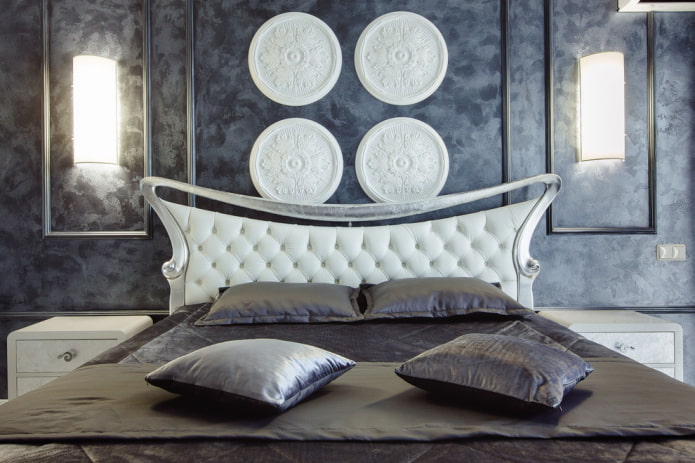
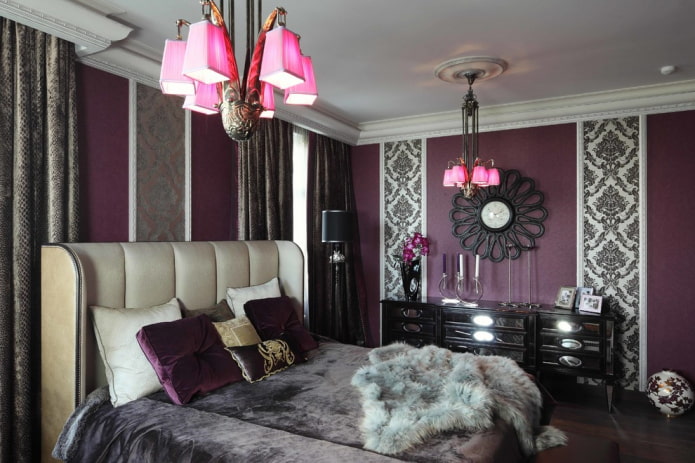
You can emphasize the ornate atmosphere with heavy bedspreads, multi-layered draperies and luxurious silk bed linen. A gilded cornice or decorative tassels will be a wonderful addition to massive curtains.
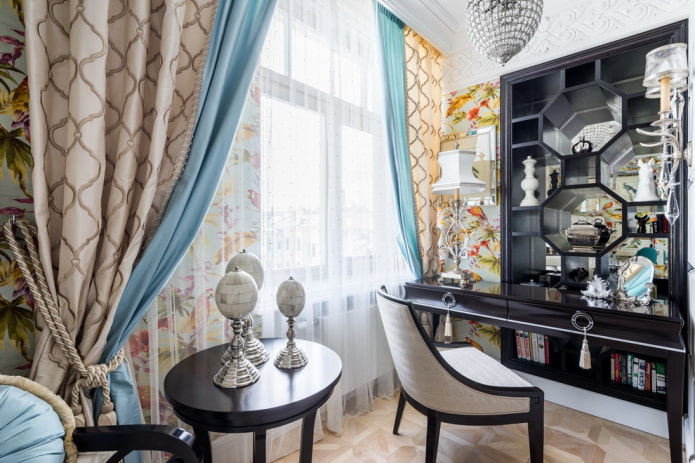
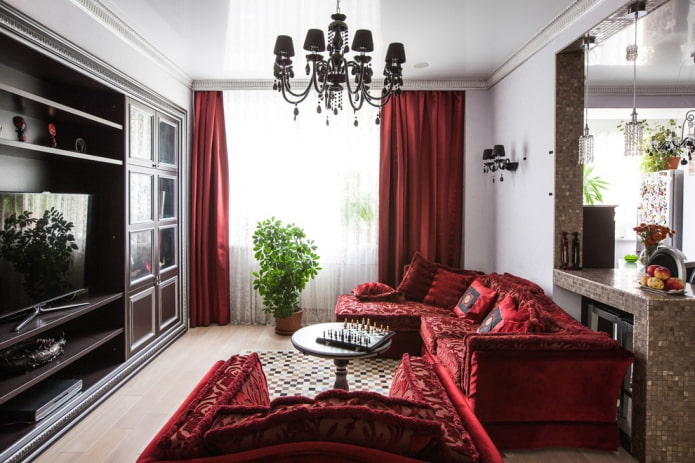
What decor is suitable?
Various decor elements allow you to complete the recreation of the style.
Paintings and panels
Mirror and mosaic panels are the true embodiment of sophistication and the personification of elitism. Such spectacular decor can be either strict and laconic, or delicate.
Now reading:
- The Complete Guide to Compact Balcony Design: 33 Inspiring Photos
- Wallpaper for a girl’s room: types, colors, style and 68 inspiring photos
- Your Ultimate Guide to Buying Used Mitsubishi Cars
- Ways to visually expand a room: ideas for compact spaces, 79 photos.
- Luxurious Mercedes E-Class: A New Era of Elegance